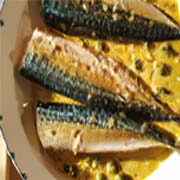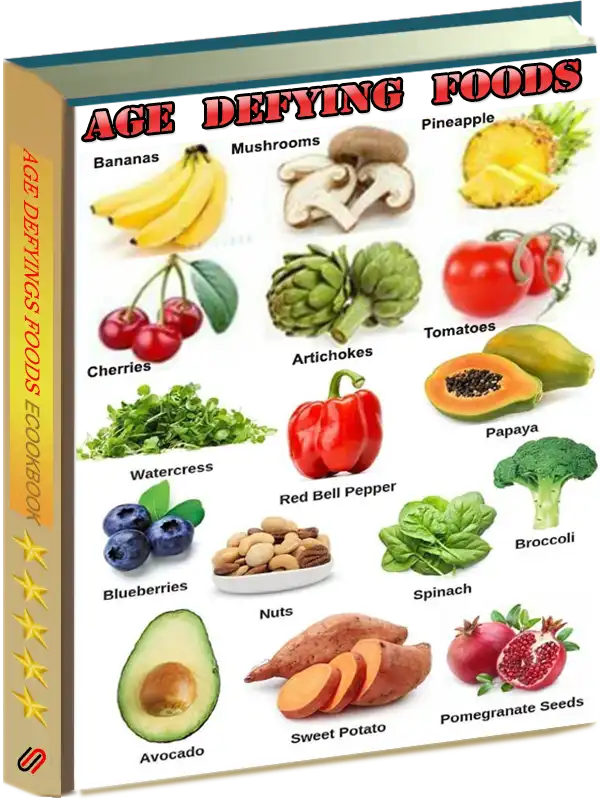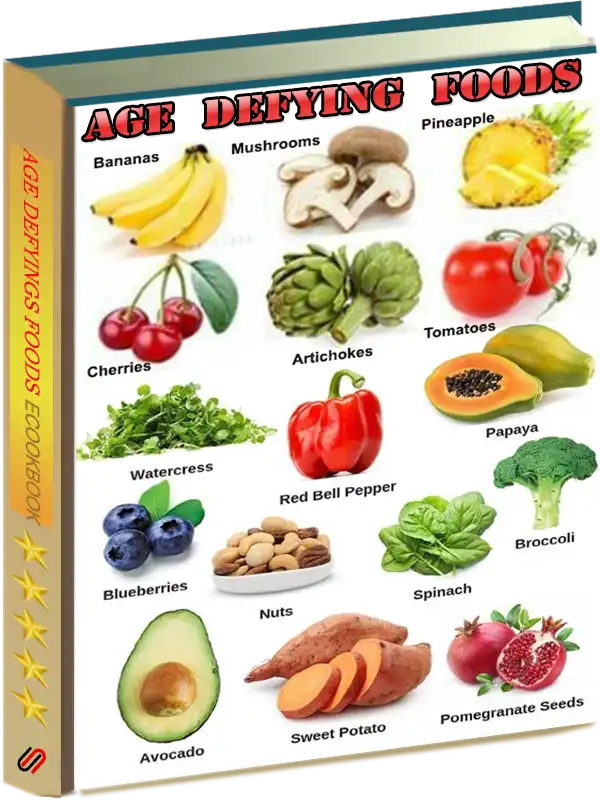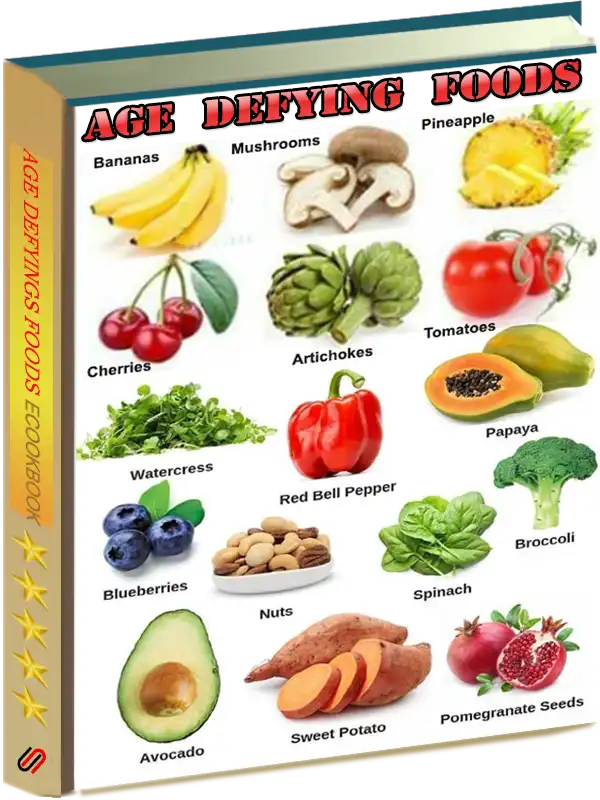If you love all things Age Defying Foods
this {Pageturner book} is for you

The {Page-Turner-Cookbook}
AGE DEFYING FOODS
It’s often said beauty comes from within – and that includes what you eat. While there are no miracle foods to turn back time, you can look and feel younger by consistently eating a healthy, nutrient-packed diet.
Here are some top age-proofing foods to include daily.
Heart disease is the leading cause of death in the United States, reports the Centers for Disease Control and Prevention. There are several heart conditions but the most common is coronary artery disease, which can lead to heart attacks. Lifestyle changes, such as changes in diet, can help treat and prevent heart disease.
“Choose healthy meals and snacks to help prevent heart disease and its complications. Be sure to eat plenty of fresh fruits and vegetables and fewer processed foods,” reports the CDC. Here are the superfoods that may benefit heart health and prevent heart disease.
ALMONDS

A 2021 study showed that almonds reduced wrinkle appearance and pigmentation in light-skinned, postmenopausal women who consumed just over two daily handfuls of the nuts for nearly six months.
The study was partly funded by California Almonds, but carried out independently to high standards.
Almonds are rich in skin-friendly essential fatty acids, as well as supplying nearly 7mg of antioxidant vitamin E – more than enough to meet your daily needs – per 28g handful.
The study was partly funded by California Almonds, but carried out independently to high standards.
Almonds are rich in skin-friendly essential fatty acids, as well as supplying nearly 7mg of antioxidant vitamin E – more than enough to meet your daily needs – per 28g handful.
AVOCADO

Avocados
Healthy fats, like those found in avocado, are essential to a healthy heart, according to the Heart Foundation.
“Despite avocados’ high fat content, the fat is heart healthy and monounsaturated,” says Christine Rosenbloom, a registered dietitian and co-author of “Food & Fitness After 50,” per AARP. “Avocado is also rich in fiber, potassium and magnesium, all nutrients associated with heart health.”
A 30-year study published in the Journal of the American Heart Association found that individuals who regularly ate avocados had a significantly lower risk of developing cardiovascular disease compared to those who rarely ate avocados.
Researchers also noted that those who ate avocados at least twice per week had a 21% lower risk of coronary heart disease, compared to those who rarely or never eat avocados
Healthy fats, like those found in avocado, are essential to a healthy heart, according to the Heart Foundation.
“Despite avocados’ high fat content, the fat is heart healthy and monounsaturated,” says Christine Rosenbloom, a registered dietitian and co-author of “Food & Fitness After 50,” per AARP. “Avocado is also rich in fiber, potassium and magnesium, all nutrients associated with heart health.”
A 30-year study published in the Journal of the American Heart Association found that individuals who regularly ate avocados had a significantly lower risk of developing cardiovascular disease compared to those who rarely ate avocados.
Researchers also noted that those who ate avocados at least twice per week had a 21% lower risk of coronary heart disease, compared to those who rarely or never eat avocados
CARROTS

Carrots and other orange-red fruit and vegetables – such as tomatoes, red peppers, sweet potato, cantaloupe and apricots – have a cosmetic effect on (Caucasian) skin, enhancing its golden glow. They're all rich in carotenoids a type of naturally occurring pigment.
A study in the journal Behavioral Ecology found this increased people’s perception of facial attractiveness.
A study in the journal Behavioral Ecology found this increased people’s perception of facial attractiveness.



Luscious berries are chockful of anthocyanins – potent antioxidant and anti-inflammatory ingredients that protect against collagen breakdown. Plus, anthocyanins appear to boost the health of gut bacteria, which in turn can reduce age-related bone loss.
Berries are packed with antioxidant polyphenols, which help reduce the risk of heart disease and improve cardiovascular health, according to research. “Blueberries, strawberries, raspberries and other berries are all bursting with plant-derived chemicals known as polyphenols. These may help protect the heart by neutralizing oxidized LDL, which forms plaque inside the arteries,” reports Harvard Health. Regularly consuming blueberries and strawberries is linked to a significantly lower risk of heart attack, according to a 2013 study published in the journal Circulation. For an 18-year period, researchers closely followed the diets of more than 90,000 women. The women who ate these berries several times a week experienced a 34% lower risk of heart attack than women who ate these berries once a month or less.
Berries are packed with antioxidant polyphenols, which help reduce the risk of heart disease and improve cardiovascular health, according to research. “Blueberries, strawberries, raspberries and other berries are all bursting with plant-derived chemicals known as polyphenols. These may help protect the heart by neutralizing oxidized LDL, which forms plaque inside the arteries,” reports Harvard Health. Regularly consuming blueberries and strawberries is linked to a significantly lower risk of heart attack, according to a 2013 study published in the journal Circulation. For an 18-year period, researchers closely followed the diets of more than 90,000 women. The women who ate these berries several times a week experienced a 34% lower risk of heart attack than women who ate these berries once a month or less.
WALNUTS

Walnuts
Regularly eating nuts, particularly walnuts, is associated with lower risk of heart disease and heart disease mortality, a 2019 study reports.
“Walnuts are a rich source of omega-3 fatty acids, specifically alpha-linolenic acid, and are beneficial for improving cardiovascular health. They reduce inflammation, improve cholesterol balance, reduce blood pressure, and reduce risk of metabolic syndrome and cardiovascular disease,” says Dr. John Higgins, a professor of cardiovascular medicine with McGovern Medical School at UTHealth Houston, per Medical News Today.
According to the Mayo Clinic, incorporating nuts into a healthy diet can help the heart by:
- Improving artery health.
- Reducing risk of blood clots.
- Decreasing risk of high blood pressure.
- Reducing risk of death from heart disease.
- Lowering bad cholesterol levels.
In a large, 32-year study published in the Journal of the American College of Cardiology, researchers found that people who ate a 1-ounce serving of nuts at least five times per week had a 14% reduced risk of developing heart disease and a 20% lower risk of developing coronary heart disease when compared to those who rarely consumed nuts.
Regularly eating nuts, particularly walnuts, is associated with lower risk of heart disease and heart disease mortality, a 2019 study reports.
“Walnuts are a rich source of omega-3 fatty acids, specifically alpha-linolenic acid, and are beneficial for improving cardiovascular health. They reduce inflammation, improve cholesterol balance, reduce blood pressure, and reduce risk of metabolic syndrome and cardiovascular disease,” says Dr. John Higgins, a professor of cardiovascular medicine with McGovern Medical School at UTHealth Houston, per Medical News Today.
According to the Mayo Clinic, incorporating nuts into a healthy diet can help the heart by:
- Improving artery health.
- Reducing risk of blood clots.
- Decreasing risk of high blood pressure.
- Reducing risk of death from heart disease.
- Lowering bad cholesterol levels.
In a large, 32-year study published in the Journal of the American College of Cardiology, researchers found that people who ate a 1-ounce serving of nuts at least five times per week had a 14% reduced risk of developing heart disease and a 20% lower risk of developing coronary heart disease when compared to those who rarely consumed nuts.
TOMATO

Tomato
Tomatoes are loaded with potassium, fiber, folate, vitamins C and K and lycopene — an antioxidant that can help protect against heart disease, per VeryWellHealth. A review of 25 studies shows a diet with tomatoes can reduce risk of heart disease. Researchers found that high blood levels of lycopene lowered risk of cardiovascular disease by 14%. Frequently eating tomatoes is also beneficial to cholesterol levels. High cholesterol can increase risk of heart disease and stroke. A 2014 study found that drinking tomato juice four times per week lowered LDL (“bad”) cholesterol and raised HDL (“good”) cholesterol.



Oily fish
Fatty fish like salmon, mackerel, sardines and lake trout are packed with omega-3 fatty acids, which aid in lowering blood pressure and reducing fats in the bloodstream, per the Mayo Clinic.
“Eating fish fights heart disease in several ways. The omega-3 fats in fish protect the heart against the development of erratic and potentially deadly cardiac rhythm disturbances. They also lower blood pressure and heart rate, improve blood vessel function, and, at higher doses, lower triglycerides and may ease inflammation,” reports Harvard Health.
In an 18-year study published in the American Journal of Clinical Nutrition, researchers closely followed the diets of more than 40,000 men. The men who ate one serving of fish per week experienced a 15% lower risk of developing heart disease compared to those who rarely or never ate fish.
If you do not enjoy seafood, fish oil supplements offer many of the same benefits. Taking fish oil supplements may reduce risk of all-cause mortality, stroke, cardiac death and sudden death, according to the National Institutes of Health.
CHOCOLATE

Dark chocolate
Chocolate is typically considered a dessert food but dark chocolate is rich in nutrients. Dark chocolate is packed with flavanols, a type of flavonoid that benefits the heart, helps with cell rebuilding and can help lower blood pressure, per Cleveland Clinic.
Regularly eating high-flavanol cocoa or dark chocolate is associated with reduced risk of cardiovascular disease, coronary heart disease and stroke, reports a study published in the journal Frontiers in Nutrition.
A 2017 review of studies found consuming dark chocolate three times every week lowered cardiovascular disease risk by 9%.
Research “suggests that chocolate consumption confers reduced risks of CHD (coronary heart disease), stroke, and diabetes,” the study review claims. “Consuming chocolate in moderation (1–6 servings/week) may be optimal for the prevention of these burdensome diseases.”
conversion of liquids
Weights
Temperatures
Measures of non liquid ingredients
Non-liquid ingredients in volume converted
|
|||||||
|---|---|---|---|---|---|---|---|
Ingredient |
1 cup |
3/4 cup |
2/3 cup |
1/2 cup |
1/3 cup |
1/4 cup |
2 tablespoons |
| All-purpose wheat flour | 120 g | 90 g | 80 g | 60 g | 40 g | 30 g | 15 g |
| All-purpose sifted wheat flour | 110 g | 80 g | 70 g | 55 g | 35 g | 27 g | 13 g |
| White sugar | 200 g | 150 g | 130 g | 100 g | 65 g | 50 g | 25 g |
| Powdered sugar/Icing sugar | 100 g | 75 g | 70 g | 50 g | 35 g | 25 g | 13 g |
| Brown sugar normally packed | 180 g | 135 g | 120 g | 90 g | 60 g | 45 g | 23 g |
| Corn flour | 160 g | 120 g | 100 g | 80 g | 50 g | 40 g | 20 g |
| Cornstarch | 120 g | 90 g | 80 g | 60 g | 40 g | 30 g | 15 g |
| Rice (not-cooked) | 190 g | 140 g | 125 g | 95 g | 65 g | 48 g | 24 g |
| Macaroni (uncooked) | 140 g | 100 g | 90 g | 70 g | 45 g | 35 g | 17 g |
| Couscous (uncooked) | 180 g | 135 g | 120 g | 90 g | 60 g | 45 g | 22 g |
| Quick oatmeal (uncooked) | 90 g | 65 g | 60 g | 45 g | 30 g | 22 g | 11 g |
| Table salt | 300 g | 230 g | 200 g | 150 g | 100 g | 75 g | 40 g |
| Butter / Margarine | 240 g | 180 g | 160 g | 120 g | 80 g | 60 g | 30 g |
| Shortening | 190 g | 140 g | 125 g | 95 g | 65 g | 48 g | 24 g |
| Fruits and légumes chopped | 150 g | 110 g | 100 g | 75 g | 50 g | 40 g | 20 g |
| chopped walnuts | 150 g | 110 g | 100 g | 75 g | 50 g | 40 g | 20 g |
| Nuts /ground almonds | 120 g | 90 g | 80 g | 60 g | 40 g | 30 g | 15 g |
| Fresh bread crumbs (not packed) | 60 g | 45 g | 40 g | 30 g | 20 g | 15 g | 8 g |
| Dry bread crumbs | 150 g | 110 g | 100 g | 75 g | 50 g | 40 g | 20 g |
| Parmesan grated | 90 g | 65 g | 60 g | 45 g | 30 g | 22 g | 11 g |
| Chocolate chips | 150 g | 110 g | 100 g | 75 g | 50 g | 38 g | 19 g |
Last page
{Page-Turner} E-Cookbooks Library
on a world cooking journey.
Sage Defying foods











